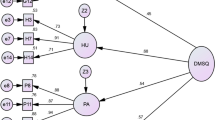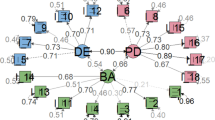Abstract
Background Adherence to type 2 diabetes management is defined as the extent to which the behaviour of a person matches the one recommended by health care professionals. Control of this disease depends on adherence to diabetes management, which includes monitoring blood glucose levels, adopting a healthy diet, exercising, taking medication, quitting smoking, and undergoing psychosocial care and periodic check-ups. This can also prevent health complications and reduce medical costs. Objective The objective of this study is to validate a culturally appropriate instrument directed towards the Mexican population that measures a patient’s level of adherence to their type 2 diabetes mellitus management. Method The study design was cross-sectional. The instrument was applied individually (face to face researcher-assisted survey) by a member of the team. The study sample included 200 participants, which were attended at an outpatient clinic. To evaluate the psychometric validity of the scale we calculated response frequencies, the discrimination of items for extreme groups, the validity, and the internal reliability. The scale of adherence for complete management in patients with type 2 diabetes includes disease monitoring, complication prevention, and social support using questions and answers based on the Likert scale, corresponding to the 5 stages of the transtheoretical model. Main outcome measure The validity and internal reliability of the instrument to measure adherence to type 2 diabetes management, which proved to be justifiable and reliable with a Cronbach’s alpha of 0.92 and a total explained variance of 65.03%. Results The instrument was composed of 29 items and 6 factors: adherence to medical Cronbach’s alpha = 0.92 and dietary treatment Cronbach’s alpha = 0.88, change in dietary habits Cronbach’s alpha = 0.89, adherence to physical activity and exercise Cronbach’s alpha = 0.84, social support Cronbach’s alpha = 0.79, and prevention of complications Cronbach’s alpha = 0.70. The instrument obtained a content validity index (I-CVI) of 0.9. Conclusion The proposed instrument, which includes factors that measure adherence in type 2 diabetes mellitus patient’s management, using the transtheoretical model of behaviour change to simultaneously identify patient motivation to change their lifestyle, is valid and reliable.
Similar content being viewed by others
References
Villalpando S, De la Cruz-Góngora V, Rojas R, Shamah-Levy T, Ávila MA, Gaona B, et al. Prevalence and distribution of type 2 diabetes mellitus in Mexican adult population. A probabilistic survey. Salud Pública de México. 2010;52(1):S19–S26.
Hernández-Ávila M, Gutiérrez JP, Reynoso-Noverón N. Diabetes mellitus en México. El estado de la epidemia. Salud Pública de México. 2013;55(2):S129–S136136.
Basto-Abreu A, Barrientos-Gutiérrez T, Rojas-Martínez R, Aguilar-Salinas C, López-Olmedo N, De la Cruz-Góngora V, et al. Prevalence of diabetes and poor glycemic control in Mexico: results from Ensanut 2016. Salud Pública de México. 2020;62(1):50–9.
American Diabetes Association. 4. Lifestyle Management: Standards of Medical Care in Diabetes-2018. Diabetes Care. 2018;41(1):S38–50.
Alsunni AA, Albaker WI, Badar A. Determinants of misconceptions about diabetes among Saudi diabetic patients attending diabetes clinic at a tertiary care hospital in Eastern Saudi Arabia. J Family Community Med. 2014;93(2):93–9.
Peyrot M, Perez-Nieves M, Ivanova J, Cao D, Schmerold L, Kalirai S, et al. Correlates of basal insulin persistence among insulin-naïve people with type 2 diabetes: results from a multinational survey. Curr Med Res Opin. 2017;33(10):1843–51.
Mathew R, Gucciardi E, De Melo M, Barata P. Self-management experiences among men and women with type 2 diabetes mellitus: a qualitative analysis. BMC Fam Pract. 2012;13(1):122.
Christie C. Proposed dietary guidelines 2015 and implications for cardiovascular disease and diabetes. J Cardiovasc Nurs. 2015;30(5):375–8.
Latham CL, Calvillo E. Predictors of diabetes outcomes in Mexico. J Transcult Nurs. 2013;24(3):271–81.
Shabibi P, Zavareh MSA, Sayehmiri K, Qorbani M, Safari O, Rastegarimehr B, et al. Effect of educational intervention based on the Health Belief Model on promoting self-care behaviors of type-2 diabetes patients. Electron Phys. 2017;9(12):5960–8.
Abubakari A-R, Jones MC, Lauder W, Kirk A, Anderson J, Devendra D. Associations between knowledge, illness perceptions, self-management and metabolic control of type 2 diabetes among African and European-origin patients. J Nurs Healthc Chronic Illn. 2011;3(3):245–56.
Jones H, Edwards L, Vallis TM, Ruggiero L, Rossi SR, Rossi JS, et al. Changes in diabetes self-care behaviors make a difference in glycemic control: the Diabetes Stages of Change (DiSC) study. Diabetes Care. 2003;26(3):732–7.
Vallis M, Ruggiero L, Greene G, Jones H, Zinman B, Rossi S, et al. Stages of change for healthy eating in diabetes. Diabetes Care. 2003;26:1468–74.
Abubakari AR, Jones MC, Lauder W, Kirk A, Anderson J, Devendra D, et al. Ethnic differences and socio-demographic predictors of illness perceptions, self-management, and metabolic control of type 2 diabetes. Int J Gen Med. 2013;6:617–28.
Abubakari AR, Cousins R, Thomas C, Sharma D, Naderali EK. Sociodemographic and clinical predictors of self-management among people with poorly controlled type 1 and type 2 diabetes: the role of illness perceptions and self-efficacy. J Diabetes Res. 2016;2016:6708164.
Garay-Sevilla ME, Nava LE, Malacara JM, Huerta R, Díaz de León J, Mena A, et al. Adherence to treatment and social support in patients with non-insulin dependent diabetes mellitus. J Diabetes Complic. 1995;9(2):81–6.
Reyes-Lagunes I, García y Barragán LF, Procedimiento de validación psicométrica culturalmente relevante: un ejemplo. In: Rivera Aragón S, Díaz Loving R, Sánchez Aragón R, ReyesLagunes I, editors. La psicología social en México, XII. México: AMEPSO Universidad de Guanajuato y UNAM; 2008. p. 625–630.
Díaz RRM, Mendoza FME, Beltmont PJ. Validación de un instrumento para evaluar la adherencia terapéutica en diabéticas durante el embarazo. Perinatol Reprod Hum. 2004;18(4):217–24.
Villalobos-Pérez A, Brenes-Sáenz JC, Quirós-Morales D, León-Sanabria G. Características psicométricas de la escala de adherencia al tratamiento de la diabetes mellitus tipo II-Versión III (Eatdm-III©) en una muestra de pacientes diabéticos de Costa Rica. Acta Colombiana de Psicología. 2006;9(2):31–8.
Hoyos DTN, Arteaga HMV, Muñoz CM. Fatores de no adherencia al tratamiento en personas con Diabetes Mellitus tipo 2 en el domicilio. La visión del cuidador familiar. Invest Educ Enferm. 2011;29(2):194–203.
Ashur ST, Shah SA, Bosseri S, Fah TS, Shamsuddin K. Glycaemic control status among type 2 diabetic patients and the role of their diabetes coping behaviours: a clinic-based study in Tripoli. Libya Libyan J Med. 2016;11:31086.
Aikens JE, Piette JD. Longitudinal association between medication adherence and glycaemic control in Type 2 diabetes. Diabet Med. 2013;30(3):338–44.
Alegre-Díaz J, Herrington W, López-Cervantes M, Gnatiuc L, Ramírez R, Hill M, et al. Diabetes and cause-specific mortality in Mexico City. N Engl J Med. 2016;375(20):1961–71.
Raj GD, Hashemi Z, Soria Contreras DC, Babwik S, Maxwell D, Bell RC, et al. Adherence to diabetes dietary guidelines assessed using a validated questionnaire predicts glucose control in adults with type 2 diabetes. Can J Diabetes. 2018;2(1):78–877.
Borbón-Morales C, Robles VA, Huesca RL. Caracterización de los patrones alimentarios para los hogares en México y Sonora, 2005–2006. Estud Front. 2010;11(21):203–37.
Pedersen BK. Anti-inflammatory effects of exercise: role in diabetes and cardiovascular disease. Eur J Clin Invest. 2017;47(8):600–11.
Funding
No special funding was obtained.
Author information
Authors and Affiliations
Corresponding author
Ethics declarations
Conflict of interest
The authors declare that they have no conflicts of interest.
Additional information
Publisher's Note
Springer Nature remains neutral with regard to jurisdictional claims in published maps and institutional affiliations.
Rights and permissions
About this article
Cite this article
Muñoz-López, D.B., Reyes Pérez, V., Garay-Sevilla, M.E. et al. Validation of an instrument to measure adherence to type 2 diabetes management. Int J Clin Pharm 43, 595–603 (2021). https://doi.org/10.1007/s11096-020-01168-0
Received:
Accepted:
Published:
Issue Date:
DOI: https://doi.org/10.1007/s11096-020-01168-0




